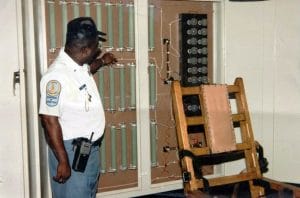Givens grew up in Richmond, Virginia. At age 14 he was at a party when he spotted a girl. As he was working up his courage to ask her to dance, a man burst into the room “looking for someone” — and shooting a gun randomly; the girl was killed. Givens decided that such killers “deserved to die” and in 1974 became a prison guard. In 1984, his supervisor asked if he was interested in an unusual position in the prison. Despite it not offering extra pay, Givens accepted — and became the prison’s executioner, first as the one who switched on the electric chair, and later, when legislation gave inmates the option of choosing lethal injection, Givens, by then promoted to Captain and the “death team’s” Chief, was the one to administer that. What was that like for him? “I am not a robot,” he said. And, he said, “I’m not a cold-blooded killer — I did it for the commonwealth.” A religious man, Givens would pray for the men he was about to execute — by their sides, if they would let him. “From the 62 lives I took, I learned a lot,” Givens said.

But death row inmate Earl Washington Jr. shook Givens’ convictions as an advocate of the death penalty. In 1982, police had coerced Washington, who has an estimated I.Q. of 69 (“intellectually disabled”), to confess to four sex crimes, including the rape and murder of a 19-year-old woman. Despite the three other charges being dropped after evidence proved it was impossible for him to be the culprit, Washington was convicted of the rape-murder and sentenced to death. Givens was to be his executioner, but Washington received last-minute stays in 1985 and 1994; in 2000, new DNA testing capabilities proved he was innocent, and he was pardoned and released — the first person on Virginia’s death row to be exonerated by DNA evidence. In 1999, Givens was charged with money laundering and perjury in a non-prison-related case; despite his protestations of innocence, he was convicted and imprisoned for four years — and shortly after learned of Washington’s innocence and release. Still religious, Givens thought the turn in both of their lives was God answering his prayers. “This was God’s way of waking me up,” he said, “by taking me to prison and taking Earl Washington out.” Once he was released, still maintaining his innocence, Givens became a vocal opponent of the death penalty, speaking to any group at any event that would have him. “Jerry was pained by his experience but also proud of how he did it,” said Abe Bonowitz, co-director of the anti-capital punishment group, Death Penalty Action — Givens was a founding member of their Board of Advisors. “That sometimes rubbed some people in the movement the wrong way. He was also a very devout religious person. He did what he could to help heal the world in the wake of the damage done during his career.” Givens died on April 13 from Covid-19. He was 67.
